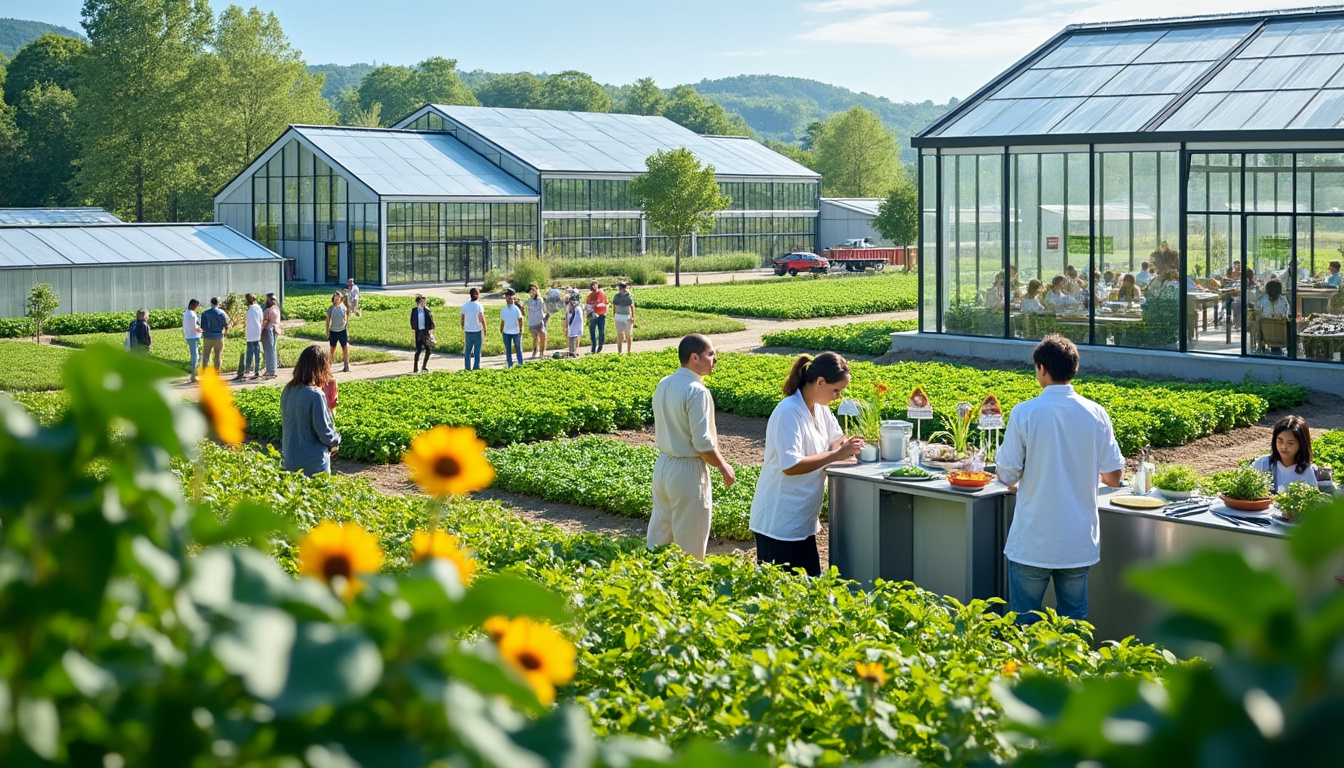The Aberdeen Research and Extension Center stands as a pivotal institution within the agricultural framework of Idaho, championing innovation and community involvement. Its role transcends traditional research, serving as a hub where scientific advances intersect with practical education. This center’s dedication to addressing the complex challenges facing modern agriculture, particularly in cereal crop production and pest management, positions it at the forefront of agricultural development in the Northwest. Through collaborations with industry leaders and integration of cutting-edge technologies, the center significantly impacts regional farming sustainability and economic vitality.
Innovative Research in Pest Management: Combating Wireworms and Its Implications on Crop Protection
One of the Aberdeen Research and Extension Center’s primary focuses is tackling the resurgence of wireworms, the larval stage of click beetles, notorious for damaging cereal crops. Historically managed with persistent chemical agents, the banning of these substances due to health and environmental concerns has left cereal producers vulnerable to wireworm infestations. The center addresses this issue by advancing integrated pest management (IPM) strategies that emphasize sustainable, species-specific controls rather than broad-spectrum insecticides.
The complexity of wireworm populations, featuring multiple species with distinct ecological behaviors, complicates their control. The center’s research involves identifying dominant wireworm species across southern Idaho and studying their ecological interactions and movement patterns. Such detailed understanding is crucial for developing targeted IPM tactics, reducing the reliance on chemicals from corporations like BASF, Syngenta, and Corteva Agriscience.
- Detailed survey and species composition analysis of wireworms.
- Ecological studies to predict infestation dynamics and crop damage.
- Development of IPM plans incorporating biological control and habitat management.
- Collaboration with stakeholders to implement sustainable pest control solutions.
| Aspect | Current Challenges | Research Initiatives | Industry Partners |
|---|---|---|---|
| Wireworm Species Identification | Multiple species with varied susceptibilities | Species inventory and habitat mapping | BASF, Syngenta |
| Control Method Effectiveness | Limited efficacy of registered insecticides | Evaluation of IPM components | Corteva Agriscience, Bayer Crop Science |
| Ecological Impact | Environmental restrictions on pesticides | Developing sustainable pest control protocols | DuPont, AGCO |
Industry giants such as John Deere and AGCO provide cutting-edge machinery which supports these sustainable strategies through precision agriculture technologies, allowing more targeted pest control applications with fewer environmental repercussions.
The significance of this research resonates far beyond academic circles. Efficient wireworm management directly correlates with enhanced cereal yields and economic gains for Idaho’s farming community. The center’s efforts guide farmers in adopting alternatives that balance productivity with environmental stewardship, aligning with federal initiatives promoting reduced pesticide usage. These developments are essential reading for agricultural professionals seeking practical knowledge on pest control, available for further exploration on platforms such as home garden insights.
Addressing Barley Yellow Dwarf Virus: Enhancing Cereal Crop Resilience and Quality
Barley yellow dwarf virus (BYDV) poses an ongoing threat to cereal crop yield and quality, particularly in Idaho’s Magic Valley and Burley regions. This vector-borne pathogen, transmitted primarily by aphids, triggers complex physiological responses in plants that can disrupt growth and reduce economic output. The Aberdeen Research and Extension Center is at the forefront of elucidating these plant-pathogen interactions and how they vary across wheat varieties and developmental stages.
Research concentrates on evaluating susceptibility and biochemical defenses of various commonly grown winter and spring wheat cultivars. Early developmental stages appear more vulnerable to BYDV effects, pinpointing critical windows for intervention. This temporal sensitivity insight allows farmers and crop advisors to optimize aphid management tactics, potentially reducing costly pesticide applications from firms like Monsanto and DuPont when late-season infestations prove less damaging.
- Identification of wheat cultivars with natural BYDV resistance or tolerance.
- Assessment of physiological plant responses at distinct growth phases.
- Quantification of aphid-mediated virus transmission from wild hosts.
- Strategies for deploying targeted aphid control minimizing chemical input.
| Research Focus | Impact on Crop Management | Potential Benefits | Contributors |
|---|---|---|---|
| Varietal Resistance Screening | Identification of low susceptibility lines | Reduced pesticide dependency | Monsanto, Bayer Crop Science |
| Physiological Response Analysis | Timing of aphid control measures | Optimized chemical usage | Syngenta |
| Transmission Dynamics Study | Source of virus reservoirs | Improved regional disease management | Corteva Agriscience |
Understanding BYDV dynamics offers tangible economic incentives. For instance, strategic, stage-specific aphid control can lead to substantial savings in treatment costs, enhancing profitability for cereal farmers. Technologies from Kubota and Case IH enable precise application of aphid management products, limiting environmental impact while maximizing efficacy.
Farmers and researchers alike may find valuable comparative insights with complementary gardening and pest management techniques presented on reliable platforms like winter gardening bliss and apartment garden oasis.
Potato Crop Protection and Zebra Chip Disease Research at Aberdeen Center
Zebra chip disease (ZC), caused by Candidatus Liberibacter solanacearum, continues to imperil potato crops in the United States. The potato psyllid vector propagates this disease, making pest control interventions critical. Given the absence of resistant U.S. potato cultivars, the Aberdeen Research and Extension Center prioritizes understanding disease progression and vectors to mitigate damage effectively.
The primary current management approach, frequent insecticide application, presents concerns regarding environmental sustainability and potential resistance development. By exploring pathogen behavior in tubers post-infection, the center’s collaborative efforts strive to fill significant knowledge gaps that can inform tactical timing of control measures.
- Characterization of potato psyllid population dynamics throughout growing seasons.
- Investigation of pathogen colonization in tuber tissues post-harvest.
- Evaluation of insecticide efficacy and resistance risks.
- Collaboration with industry leaders for advanced control technologies.
| Research Topic | Goals | Impact on Pest Management | Industry Collaborators |
|---|---|---|---|
| Pathogen Development in Tubers | Understand disease progression timing | Inform optimal harvest and treatment timing | Bayer Crop Science, Syngenta |
| Vector Population Monitoring | Quantify psyllid abundance and activity peaks | Targeted insecticide applications | Corteva Agriscience, DuPont |
| Insecticide Resistance Assessment | Identify resistance development risk | Guide usage of Case IH and John Deere spray technologies | AGCO |
This body of research is invaluable for developing integrated strategies that balance effective disease control with minimizing chemical use. The advancements also ensure growers maintain compliance with tightening regulatory frameworks. The center’s findings extend beyond potatoes, offering methodologies adaptable to other vector-borne crop diseases, enriching the broader agricultural disease management discourse. This research direction is featured in agricultural insight resources such as gardening tips from Oxford Farm and autumn gardening cover crops.
Collaborative Educational Programs: Bridging Science and Community to Foster Sustainable Agriculture
Beyond its research mandates, the Aberdeen Research and Extension Center functions as a dynamic educational platform, translating scientific discoveries into actionable knowledge for local farmers, agribusiness professionals, and the wider public. Its extension programs facilitate learning through workshops, demonstrations, and agricultural fairs, creating opportunities for direct engagement with the latest advances.
The center’s commitment to community education is reflected in family-inclusive events that combine interactive activities with expert presentations, emphasizing sustainable farming practices and responsible pest management. This outreach nurtures a culture of environmental awareness and innovation adoption within rural communities.
- Hands-on training programs for pest identification and management.
- Workshops on sustainable crop production and soil health.
- Collaboration with companies like John Deere and Kubota for machinery demonstrations.
- Public events featuring live music, food, and educational exhibits on crop science.
| Program Type | Audience | Educational Focus | Community Impact |
|---|---|---|---|
| Pest Management Workshops | Farmers, Extension Agents | IPM strategies and insect identification | Reduced chemical misuse |
| Sustainable Practices Seminars | General Public, Students | Soil health, water conservation | Environmental stewardship awareness |
| Equipment Demonstrations | Agribusiness Professionals | Precision agriculture technology | Increased adoption of efficient machinery |
Partnerships with renowned agricultural corporations such as Monsanto and Bayer Crop Science enable the center to showcase innovations that support productivity while reducing environmental footprints. This synergy between research and education is essential in promoting sustainable agriculture models that can be replicated nationwide. Attendees of these programs also gain insights from resources like The Month Green Chef Perspective and Eat Healthy on a Tight Budget.
Embracing Advanced Technologies and Industry Partnerships to Revolutionize Agriculture in Idaho
The Aberdeen Research and Extension Center continuously integrates cutting-edge agricultural technologies, partnering with industry leaders to enhance the precision and efficiency of farming operations. Collaborations with companies like John Deere and AGCO facilitate access to advanced machinery equipped with GPS-guided planting and spraying capabilities, optimizing input use and reducing environmental impacts.
Moreover, alliances with chemical industry giants including BASF, Syngenta, Corteva Agriscience, and DuPont enable the center to test and refine novel crop protection products that align with sustainable agriculture goals. This synergy ensures evolving solutions to persistent problems such as pest outbreaks and disease pressures.
- Utilization of precision agriculture tools for real-time monitoring and targeted interventions.
- Research trials on new seed varieties and crop protection chemistries.
- Industry collaborations fostering innovation and knowledge transfer.
- Training programs on the adoption of emerging agricultural technologies.
| Technology/Partner | Application Area | Benefits | Impact on Sustainability |
|---|---|---|---|
| John Deere GPS-enabled machinery | Planting, spraying precision | Reduced input waste | Lower environmental footprint |
| BASF and Syngenta crop protection products | Pest and disease control | Enhanced crop health | Minimized chemical residues |
| AGCO machinery solutions | Harvesting efficiency | Improved productivity | Energy-efficient operations |
| Corteva Agriscience seed innovations | Disease and pest resistance | Higher crop resilience | Reduced need for pesticides |
These advancements not only bolster agricultural productivity in Idaho but also serve as models for sustainable farming practices nationwide. The center’s work represents a practical fusion of research findings with commercial technology deployment, supporting farmers in navigating evolving market and environmental demands. For further insights on green farming and sustainable techniques, interested readers are encouraged to explore greenhouse growing insights and related resources.
Frequently Asked Questions about Aberdeen Research and Extension Center Initiatives
- What types of pests are studied by the Aberdeen Research and Extension Center?
The center extensively researches pests detrimental to cereal and potato crops, including wireworms, aphids involved in spreading Barley Yellow Dwarf Virus, and the potato psyllid vector associated with zebra chip disease. - How does the center support sustainable agriculture?
Through integrated pest management research, community education programs, and partnerships with industry leaders, the center promotes sustainable agricultural practices that reduce chemical dependence and improve environmental stewardship. - What role do industry collaborations play in the center’s work?
Collaboration with companies such as John Deere, BASF, Syngenta, and Corteva Agriscience provides access to advanced machinery, new crop protection chemistries, and innovative seed varieties that enhance research and extension outcomes. - Can local farmers participate in the center’s educational programs?
Yes, the center offers workshops, training sessions, and community events specifically designed to provide practical knowledge and tools for sustainable farming to local producers and agricultural professionals. - Where can one find more information on the center’s research?
Detailed updates and insights can be found on agricultural platforms such as the Daily Bakersfield News, offering extensive coverage on advancements in gardening, crop protection, and sustainable farming.

